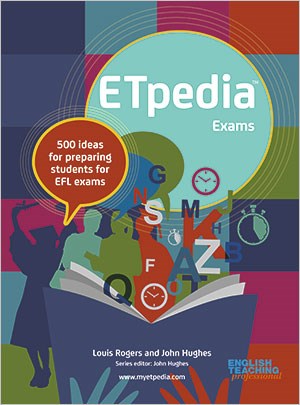10 questions with the co-author of ETpedia Exams
1 Who are you and what have you written for the ETpedia series?
My name is Louis Rogers and I am the co-author of the new ETpedia Exams title. 
2 What’s your previous experience of exam courses?
I have taught a lot of different exam courses in different countries including FCE, CAE, CPE, IELTS and BEC. I have also taught exams for specific contexts such as EAP.
3 What’s your typical day like at the moment?
Most of my time now is spent writing various ELT courses for a range of publishers. I find you spend a lot of your time looking for new text ideas. Even when you read for pleasure you often find yourself reading an article and thinking about how it can be used to teach different language points. In the mornings I tend to focus on the harder draft one writing and in the afternoons, I tend to write simpler tasks, proof read, check and rewrite tasks.
4 Why do you enjoy teaching exam classes?
One of the pleasures I think is also one of the greatest challenges. The students are often very motivated because their success in the exam will have a direct impact on their future. However, this can also put pressure on the students and teachers to try to reach these targets. It’s definitely a more motivating context for both teachers and learners but there are pressures there because of this.
5 What is one of the biggest challenges for a teacher of exam courses?
When you are new to a particular exam it is challenging to get your head around the exam format and the best way to approach each task. However, I think for all teachers one of the greatest challenges is managing the expectations of students. It takes a long time for someone’s level of English to improve and students don’t always have the patience for this.
6 How did you go about planning and writing ETpedia Exams?
One of the first tasks was how to organise the book. We, myself and John Hughes, decided to focus on particular skill areas as there is actually a lot of common ground between a wide range of exams. We then worked on dividing each skill into key areas. Once we actually started writing we each led on different sections and then contributed additional ideas to each other’s pages.
7 What kind of teacher do you think will find this book useful?
Undoubtedly, the book will be useful to anyone who is new to teaching exams. It will also help when people are asked to teach a new exam they haven’t taught before. However, I think there are also some useful ideas for experienced teachers to add to their repertoire.
8 What did you learn from writing the book?
I think it reinforced how difficult exams classes can be to balance in terms of students perceived needs and actual needs. Students tend to be most motivated by exam practise, especially when time is tight. However, it’s important to integrate as much language work as possible rather than endless exam practice and feedback.
9 What’s your favourite classroom activity in the book?
I probably like the section on generating ideas and planning writing or the section on opinion based essays the most. Students often need a lot of practise in this. Some of the topics in the writing sections of exams can be quite abstract and look at topics students have never really thought about before. Using media, infographics, getting students to defend their position or consider other perspectives all really help to develop and shape their ideas.
10 What’s one piece of good advice that you once received from another teacher?
One of the most important pieces of advice was also one of the briefest. Diane Schmitt was my tutor on my MA in ELT at Nottingham Trent. On one module on materials writing her simple advice for analysing materials was to have the question in your mind ‘The students are busy, but what are they doing?’ Constantly, keeping this approach in mind really helps focus materials writing, lesson planning and teaching.
ETpedia Exams is by Louis Rogers and series editor John Hughes. It provides provides 500 activities, tips and pointers for preparing students for EFL and ESL exams, whilst ensuring their general English continues to improve as well. Find out more here.
Comments
Write a Comment
Comment Submitted